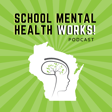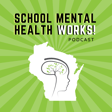
Episode 1: If Not Now, When?
This inaugural episode of the series features a conversation between Coalition Board Chair, Julie Hueller of the Racine Collaborative for Children’s Mental Health and Board Treasurer, Kathy Markeland of the Wisconsin Association of Family & Children’s Agencies. Julie and Kathy discuss some of the foundational building blocks for growing student mental health systems by exploring the story of the community partnership in the Racine Unified School District.
Their conversation highlights the role that the Coalition plays in sharing best practice and advancing state policies to help Wisconsin communities advance school mental health initiatives. By leveraging the elements of the comprehensive model and expertise of Wisconsin networks, schools across the state are showing that school mental health works!
Show Notes
Coalition for Expanding School-Based Mental Health in Wisconsin
Wisconsin Department of Public Instruction - School Mental Health website
Wisconsin School Mental Health Framework
Wisconsin Association of Family and Children's Agencies
Spotlight on Racine Collaborative for Children's Mental Health Partnership


